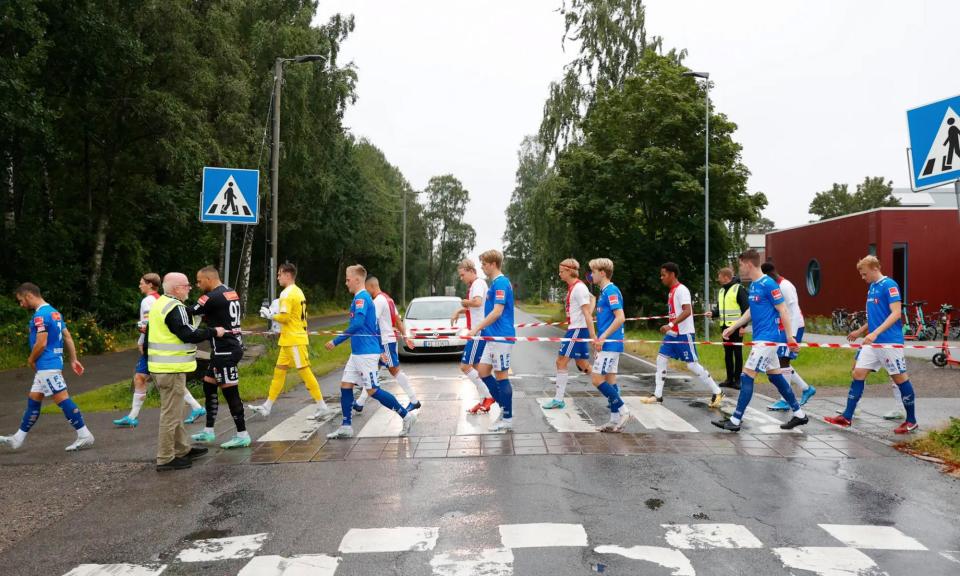‘Everything is possible’: YMCA football team’s rise to Norwegian top flight

Football’s ability to conjure ridiculous stories is legion, but even so the one about the YMCA club in Norway’s Eliteserien is ridiculous. Yet that is exactly where KFUM-Kameratene Oslo find themselves: on Tuesday, they make their top-flight debut with a home game against HamKam.
Though KFUM remain a local community club – their ground holds only 3,000 and is accessed via a zebra crossing – their rise has been meticulously planned. “We have learned year by year,” says Tor-Erik Stenberg, the general manager. “Small changes to be more and more and more professional.” So they began by giving players amateur contracts, then moved training from evening to daytime, then focused on better marketing, and so on; this season, fortified with the funds to improve more than one aspect, they have added a match analyst, expanded their medical department, and taken the team abroad for warm-weather training.
Sensible, patient growth may be unusual in football, but Stenberg attributes KFUM’s success not to its processes but to its culture. “We are a YMCA club,” he says. “We have a Christian-based foundation with Christian values: forgiveness, love, caring. That doesn’t mean that we don’t fight because on the field, football is football. It doesn’t mean that we don’t get angry, but it has to do with how we behave before and afterwards.”
This philosophy is embodied by Johs Moesgaard, the KFUM manager cleverly brought in as assistant when the club realised Jørgen Isnes, his predecessor, was doing so well he would soon be poached by a richer rival. “We are looking for people who understand human beings first, who understand that results are a product of how you treat people,” Stenberg says. “Johs understands how to mix a group, develop the people within the group – that’s his main skill. And if you can build a group with a common understanding of how to play, how to behave – a group like that will die for each other and you will get better results.”
Consequently, prospective signings know for sure that if they join KFUM, they will have a good time making good friends. “But you will never be rich,” Stenberg says, “so it attracts people who enjoy those things. And also of course, we have developed many players now so young players like and enjoy to come to us.”
Moesgaard agrees that his main responsibility is creating the right environment for his players, noting that the Christian values KFUM represents are also universal values – there are not many Christians in his squad, but there are Muslims and atheists. “Everyone is important and everyone has equal opportunities,” he explains. “It’s ‘a club for life’ like the slogan says. It’s a place where you will feel respected, you will feel trust, you will feel that you mean something.”
But treating people with kindness doesn’t mean lowering standards. “In Norway we use a lot of excuses: ‘I don’t have money, I don’t have this, I don’t have that,’” Moesgaard says. “We are a small club, little resources, but everything is possible. Stop whining, just go to work and everything can be made.”
The drive to make the best of things is of central significance when scouting potential acquisitions, who must be the right kind of person as well as the right kind of player for the club’s non-negotiable 3-4-3 short-passing style. “I put emphasis on getting in players with X Factor,” Moesgaard says. “I love players who have that extra edge in their game. We find players from lower divisions – players who sit on the bench in other clubs or are told ‘you’re not making it here’ – but we see the extra thing. And we think that I can bring forward their skills by my leadership, and I’m very including, I’m not that harsh. I keep a close contact with my players because I believe that the interaction between us makes them more comfortable, more safe – that they’re brave to make mistakes in the game.”
By way of example, Moesgaard references 21-year-old Obilor Okeke, a winger of questionable decision-making but rich potential, which no previous manager had been able to extract. Moesgaard, though, was certain he could reach him and, excited by his ability to dribble at extreme pace, rescued him from Fredrikstad reserves then organised the team to accentuate his strengths. Similarly, Mo Lion Njie is a centre-back extremely good on the ball but who lacked a little defensive nous. “So,” says Moesgaard, “we worked on that weakness, put runners around him to protect him, and he controls the game.”
Despite their new status, KFUM will stick to their method because, unusually for a team built on a limited budget, they believe their advantage over their opponents is a technical one. “We’re very good at moving the ball around, passing – having short distances between our players so we can regain possession when we lose the ball,” says Moesgaard. “But when the other team has greater physique, that’s when the challenge has started for us – handling what happens in the boxes and also around the set-plays. That is where I’m most curious on where we are.”
Whatever happens from here, though, where they are means KFUM have already won, their story enshrined in the annals of the game for evermore. “The football life is quite cynical,” Moesgaard says. “So I’ve been thinking a lot about my father, who’s been watching me, who’s been sick for a while with cancer, and my daughter. All of those things go through your head – that you made the people closest to you proud.”

